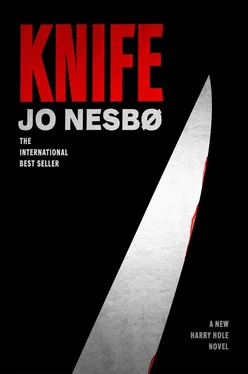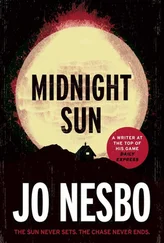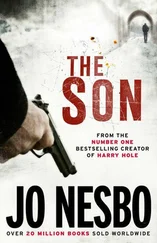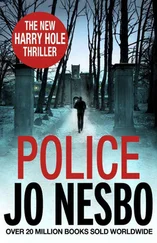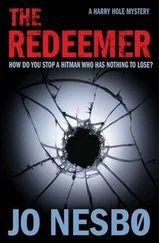He looked up when the waiter snapped the napkin open like a flag in the wind before letting the white damask settle on Alexandra Sturdza’s lap.
“I should have made an effort,” she laughed.
“You look like you did.” Sung-min smiled, and leaned back as the waiter repeated the same gesture with his napkin.
“This?” she said, pointing at her tight skirt with both hands. “These are my work clothes. I just don’t dress as informally as my colleagues. And you’ve made an effort. You look like you’re going to a wedding.”
“I’ve just come from a funeral,” Sung-min said, and saw Alexandra flinch as if he’d slapped her.
“Of course,” she said quietly. “I’m sorry. Bjørn Holm?”
“Yes. Did you know him?”
“Yes and no. He worked in forensics, so obviously we spoke to each other over the phone from time to time. They’re saying he killed himself?”
“Yes,” Sung-min said. He replied “yes” rather than “it looks like it” because there really wasn’t any doubt. His car had been found parked at the side of a grit track at the top of a ridge with a view over the farmland of Toten, not far from his childhood home. The doors were locked, the key was in the ignition. A few people had been confused that Bjørn Holm had been sitting in the back seat, and that he had shot himself in the temple with a pistol whose serial number couldn’t be traced back to anyone. But his widow, Katrine Bratt, had explained that Holm’s idol, Something-or-other Williams, had died in the back seat of his car. And it wasn’t particularly unlikely that a forensics officer had access to a weapon with no registered owner. The church had been full of family and colleagues, from both Police Headquarters and Kripos, because Bjørn Holm had worked for both. Katrine Bratt had seemed composed — more composed, in fact, than when they had met at Norafossen.
After she had efficiently worked her way through the queue of people offering condolences, she had come over to him and said there were rumours that he wasn’t happy where he was. That was the word she had used, pronounced in her distinct Bergen accent. Happy . And said they should have a chat. She had an empty position that needed to be filled. It had taken him a moment to realise that she was talking about Harry Hole’s job. And he wondered if it was doubly inappropriate for her to be talking shop after her own husband’s funeral, and to offer Sung-min the job of a man who was still only missing. But presumably she needed whatever distractions she could find to take her mind off the pair of them. Sung-min said he’d think about it.
“I hope Kripos’s budget can handle this,” Alexandra had said when the waiter brought the first course and told them it was raw scallop, black pepper mayonnaise, Ghoa cress and a soy-butter sauce. “Because Forensic Medicine can’t.”
“Oh, I think I’ll be able to justify the expense, if you can keep the promise you made over the phone.”
Alexandra Sturdza had called him the previous evening. Without beating around the bush, she had told him that she had information regarding the Rakel Fauke case. That she was calling him because the implications were sensitive, and that she had decided she trusted him after their first encounter. But that she would prefer not to discuss it over the phone.
Sung-min had suggested lunch. And booked a table somewhere she had rightly guessed wasn’t within the price range covered by Kripos. He would have to pay for it himself, but he had told himself it was a wise investment, a way of nurturing a professional contact in the Forensic Medicine Institute that could turn out to be useful if and when he needed a favour. A DNA analysis that needed to be prioritised. Something like that. Probably. Somewhere at the back of his mind he had an idea that there was more to it than that. What? He hadn’t had time to give the matter too much thought. Sung-min glanced at the busker, who was in full flow now. People were rushing past, paying him no attention. Hank. That was what his colleague had said. Hank Williams. He would have to google him when he got home.
“I’ve analysed Harry Hole’s blood from the trousers he was wearing on the night of the murder,” she said. “It contains Rohypnol.”
Sung-min looked back from the street and focused on her.
“Enough to knock a man out for four or five hours,” she said. “That got me thinking about the time of the murder. Our medical officer narrowed it down to between 22:00 and 02:00, of course. But that was based on body temperature. There were other indications, such as the discolouration around the wounds, which suggest that it could” — she held up a long forefinger, which looked even longer because of the vivid pink of her fingernail — “and I repeat could , have happened earlier.”
Sung-min remembered that she hadn’t been wearing nail polish last time. Had she painted them specially?
“So I checked with the company that supplies electricity to Rakel Fauke’s home. It turns out that consumption went up by seventy kilowatts between 20:00 and 24:00. All that electricity suggests an increase in temperature, and if that happened in the living room, it would mean a rise in temperature of five degrees. My medical officer says that if that was the case, she would have given the time of death as between 18:00 and 22:00.”
Sung-min blinked. He had read somewhere that the human brain can only process sixty kilobits per second. And that that makes the brain a very weak computer. But the fact that it can work as fast as that depends on how data already stored there is organised. That most of our conclusions rely on recalling memories and patterns and using them rather than thinking new thoughts. Perhaps that was why it was taking him so long. He was having to think new thoughts. Completely new. He heard Alexandra’s voice as if it were coming from far away:
“From what Ole Winter has said in the papers, Harry Hole was in a bar with witnesses until 22:30. Is that correct?”
Sung-min stared down at his crayfish. It stared back disinterestedly.
“So the question now has to be whether you have ever had anyone else in your sights? Someone you might have ignored because they had an alibi for the time it was assumed Rakel was murdered. But who may not have had an alibi between 18:00 and 22:00.”
“You’ll have to excuse me, Alexandra.” Sung-min stood up, then realised he’d forgotten his napkin, which fell to the floor. “Please, finish your lunch. I need... I’ve got some things I need to get on with. Another day we can... you and I can...”
He saw from her smile that they could.
He walked away, gave the maître d’ his card and asked him to send him the bill, then hurried out into the street. The busker was playing a song Sung-min had heard, something about a car crash, an ambulance and Riverside, but he wasn’t interested in music. Songs, lyrics, names, for some reason none of them stuck. But he remembered every word, every moment of the transcription of the interview with Svein Finne. He had arrived at the maternity ward at 21:30. In other words, Svein Finne had had three and a half hours in which to murder Rakel Fauke. The problem was that no one knew where Finne was.
So why was Sung-min running?
He was running because it was quicker.
What difference did it make if he was quicker, if everyone was already trying to find Svein Finne?
Sung-min wanted to try harder. And he was better. And extremely motivated.
Ole Winter, the useless scavenger, would soon be choking on his big fat team victory.
Dagny Jensen got off the metro at Borgen. She stood there for a moment, looking out across Western Cemetery. But that wasn’t where she was going; she didn’t know if she would ever go into a cemetery again. Instead she walked down Skøyenveien to Monolitveien, where she turned right. She walked past the white wooden houses behind picket fences. They looked so empty. Afternoon, a weekday. People were are work, at school, doing things, being active. She was static. On sick leave. Dagny hadn’t asked for it, but her psychologist and the head teacher had told her to take a few days off to compose herself, and see how she really felt after the attack in the women’s toilet. As if anyone wanted to think about how they really felt!
Читать дальше
